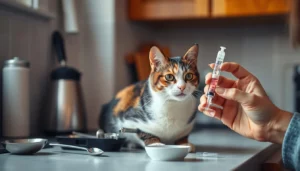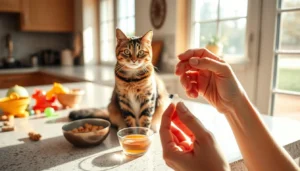Every cat owner knows the heart-racing moment when it’s time to give medicine. Your furry friend turns from a cuddly companion into a squirming, resisting ball of fur. Learning how to make your cat drink medicine is an art that can save your pet’s life and keep your sanity.
Administering liquid medicine to a cat can feel like navigating a battlefield. Your usually calm kitty suddenly becomes an expert at dodging, hiding, and making the medicine administration process seem impossible. But don’t worry—with the right tricks to give cats medicine, you can turn this challenging task into a smooth, stress-free experience.
Understanding the nuances of how to give liquid medicine to a cat requires patience, strategy, and a deep connection with your feline friend. This guide will walk you through proven techniques that make medication time less stressful for both you and your cat.
Understanding Why Cats Resist Taking Medicine
Giving your cat medicine can seem like a big challenge. Cats are complex and have unique behaviors that make it hard to give them medicine. Knowing why your cat doesn’t want to take medicine is the first step to helping them.
Natural Defensive Instincts
Cats have strong survival instincts that make them cautious of new things. When you try to give them medicine, they see it as a threat. This makes them defend themselves and resist the medicine.
- Cats have a strong sense of smell that picks up on new smells
- They are naturally careful of new touch
- Bad experiences in the past can make them even more resistant
Medication Challenges for Cat Owners
Getting your cat to take medicine needs patience and a smart plan. Most cat owners face the same problems when trying to give medicine. It can be stressful for both the cat and the owner, leading to frustration and not finishing the treatment.
Impact of Stress on Medicine Administration
Stress is a big factor in giving medicine to cats. When cats are stressed, they resist medicine more. Their emotional state makes even simple medicine attempts hard.
Understanding your cat’s perspective is key to successful medicine administration.
By knowing these natural instincts and challenges, you can find better ways to give your cat medicine without stress. Being empathetic and gentle will make medicine time less scary for both you and your cat.
Essential Preparation Steps Before Giving Medicine to Your Cat
It can be tough to give medicine to a cat, and it’s even harder if they don’t like it. Getting ready is crucial to make it easier for both you and your cat.
After giving medicine, your cat might still be vocal. Curious what it means? Discover why your cat is meowing so much and how to comfort them.
First, make a calm space. Pick a quiet room where your cat feels safe. Have everything you need ready to avoid stress and make it faster.
- Gather medication and any recommended tools
- Prepare a soft towel or blanket for wrapping
- Have treats ready for positive reinforcement
- Keep a syringe or dropper nearby for liquid medications
When hiding medicine in food, pick a small amount of wet food or a favorite treat. Make sure the medicine doesn’t change the food’s taste too much. Cats are very picky about flavors.
“Patience and preparation are your best tools when giving cats pills or liquid medicine.”
Here are some easy ways to give cats medicine:
- Crush pills into a small amount of tasty wet food
- Use a pill pocket treat designed for medication
- Ask your veterinarian about flavored medication options
Get ready to stay calm and confident. Cats can feel your stress, making it harder to give them medicine. Being calm helps a lot.
How to Make Your Cat Drink Medicine: Professional Techniques
It can be tough to give medicine to cats, but the right way makes it easier. These tips will help you treat your sick cat at home with confidence.
Success in giving medicine needs patience, skill, and staying calm. Your aim is to keep your cat calm and give them the treatment they need.
Safe Handling and Restraint Techniques
Start by making a quiet place for medicine time. Wrap your cat in a soft towel for safety and to stop them from moving too much. This gentle hold stops sudden moves that could hurt or make giving medicine hard.
- Choose a calm, enclosed space
- Use a soft towel for gentle restraint
- Keep movements slow and deliberate
- Speak in a soothing voice
Step-by-Step Medicine Administration
Learning to give liquid medicine with a syringe takes practice. Follow these steps carefully:
- Position your cat securely
- Tilt the head slightly back
- Gently open the mouth
- Slowly dispense medicine
- Massage throat to encourage swallowing
Recovery and Positive Reinforcement
Right after giving medicine, give your cat a favorite treat or extra love. This positive feedback makes future medicine times less stressful.
A calm approach and consistent positive reinforcement can transform medicine time from a struggle to a manageable task.
Remember, practice and patience are key to successfully medicating your cat.
Clever Ways to Hide Medicine in Cat Food and Treats
It can be tough to hide medicine in cat food. If your cat spits out medicine, you need a smart plan. This plan should make giving medicine easier for you and your cat.
Here are some clever ways to hide medicine in cat food:
- Use soft, strong-smelling wet food to mask medication taste
- Try commercial treat pouches designed for hiding pills
- Crush tablets and mix with small amounts of favorite treats
- Utilize cream cheese or plain yogurt as a medicine carrier
Understanding your cat’s likes is key to giving stubborn medication. Some cats like certain textures or flavors. These can help hide the medicine.
Pro tip: Always consult your veterinarian before modifying medication administration to ensure effectiveness.
When hiding medicine in cat food, try these extra tips:
- Use small portions of food to ensure complete medication consumption
- Avoid mixing medicine with large meal quantities
- Experiment with different food types and textures
- Reward your cat immediately after successful medication
Remember, patience and creativity are key when helping your cat take necessary medication.
Advanced Tips for Dealing with Stubborn Cats
Dealing with a cat who won’t take medicine can be tough. Some cats are hard to give medicine to. You need creative ways to keep them healthy.
When usual methods don’t work, you’ll need new strategies. It’s important to know your cat’s personality. Then, you can adjust your approach to fit them.
Behavioral Modification Strategies
There are natural ways to help your cat accept medicine. Try these behavioral tips:
- Create positive associations with medicine time
- Use gentle restraint techniques
- Practice calm handling during non-medication times
- Reward cooperation with treats or playtime
Alternative Medicine Delivery Methods
Learn how to make your cat drink medicine with different methods:
- Transdermal gels applied to ear skin
- Liquid medications mixed with favorite foods
- Flavored compounded medications
- Long-acting injectable treatments
When to Seek Veterinary Assistance
At times, you might need a vet’s help. If your cat always refuses medicine or seems very stressed, see a vet. They can suggest special methods or treatments that are less upsetting for your cat.
Remember, patience and consistency are your best tools when administering medicine to a resistant cat.
Conclusion
Giving your cat medicine without stress is all about patience and understanding. This guide has shared many useful tips for tricky situations. Every cat is different, so try different methods to find what works best for your pet.
Learning to give medicine to cats means building trust and making the process positive. Being consistent is crucial. Your calm and gentle touch can greatly reduce your cat’s stress. Vets suggest staying calm and using rewards to make medicine time easier.
It’s important to tailor your approach to your cat’s personality. Some cats like hidden medicine in treats, while others need it given directly. The aim is to reduce stress for both you and your cat, ensuring they get the care they need.
With time and effort, giving medicine can become easier. Your commitment to your cat’s health will make your bond stronger. It will also help keep your cat happy and healthy.
FAQ
Why do cats resist taking medicine?
Cats naturally resist medicine because of their defensive instincts. They like new tastes, textures, and experiences. These can feel threatening, making them want to avoid it.
They also have a strong sense of smell and taste. This makes many medicines unappeal to them.
What’s the best way to handle my cat when giving medicine?
When giving medicine, be calm and gentle. Make sure the area is quiet. If needed, wrap your cat in a towel.
Use a soft but firm grip. Always support their head and neck. This makes swallowing easier. Work quickly but carefully to avoid stress.
How can I hide medicine in food effectively?
Use strong-flavored foods like wet cat food or tuna. Crush pills (if okay with your vet) and mix well. Use a small amount of food to ensure they eat the whole dose.
Avoid using too much food. This might make your cat suspicious.
What if my cat consistently spits out medicine?
Try different methods like liquid medications or transdermal gels. Your vet might suggest injectable or long-lasting medications. Some cats like medicine in pill pockets or special treats.
Are there any natural alternatives to traditional cat medicine?
Natural supplements can support your cat’s health, but they’re not a complete replacement. Always talk to your vet first. Options include probiotics, omega-3 fatty acids, and herbal supplements.
Never use natural remedies instead of prescribed medicines without your vet’s advice.
How can I reduce stress during medicine administration?
Make a consistent routine and use positive reinforcement. Stay calm yourself. Practice gentle handling to build trust.
Use calming sprays or treatments before medicine. Reward your cat right after to make it a positive experience.
When should I seek veterinary help for medication issues?
Seek help if you struggle to give medicine, if your cat reacts badly, or if it’s not working. Your vet can offer new methods or adjust the medication.
How long should I keep trying to give my cat medicine?
Keep trying, but don’t stress your cat or your relationship. If you’ve tried many ways without success, see your vet in a week. They can suggest new ways or techniques.



